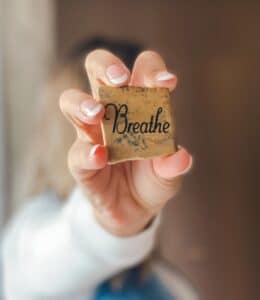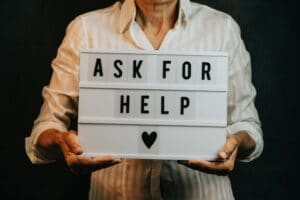THE SLEEP – MENTAL HEALTH CONNECTION
May is mental health awareness month. The world seems to be an especially stressful place for all of us right now. While much is beyond our control, there are things you can do to protect your own wellbeing. For one thing, do you realize that sleep and mental health are intertwined?
Common mental health challenges like forgetfulness, anxiety, stress, burnout syndrome, and depression all have a connection to sleep. We’ll look at each area then suggest some practical natural remedies for better sleep and your mental wellness, too.
You are sleep deprived whenever you don’t get the sleep you need. The signs of sleep deprivation according to the Sleep Foundation include:
- Slowed thinking
- Reduced attention span
- Worsened memory
- Poor or risky decision-making
- Lack of energy
- Mood changes including feelings of irritability, stress, and anxiety
Sound familiar?
Tired minds change how we think and the way we process information. It’s worth noting how too little sleep can resemble symptoms of mental illness.
So, are we just sleep-deprived or is there another underlying problem? Keep reading to find out.
F ORGETFULNESS and LEARNING
ORGETFULNESS and LEARNING
Forgetfulness and “unlearning” are signs of sleep deprivation, but they are also symptoms of depression and anxiety. But we’re all forgetful sometimes, right? Just because you don’t get enough sleep doesn’t mean you’re mentally ill or have dementia. The flip side of that coin is what we now know is a fundamental reason we sleep — to bind our memories which is essential for learning.
Do you ever wonder if it’s forgetfulness or there is a more serious mental problem?
Learn more >>> Do Memory Problems Always Mean Alzheimer’s Disease?
BURNOUT, SLEEP and MENTAL HEALTH
Tiredness is no friend to our productivity. It can be especially hazardous to our careers. Yet many of us are overworked and exhausted leading to –
- Work becoming more difficult.
- Trouble concentrating.
- Work not getting done or not on time.
- Poor work quality.
- Accidents on the job.
- Strained professional relationships.
Longer workdays mean shorter nights. The time for recovery and relaxation shrinks. Sleeping gets more and more difficult while work doesn’t get any easier. This is a sure formula for burnout.
When work-and-life are unbalanced, this causes additional stress making it harder or even impossible to fall asleep. We come to dread bedtime. Long nights with the pressure of wanting to sleep grows, but then the alarm goes off. The cycle begins again and it’s a recipe for burnout.
More sleep isn’t always the cure for burnout either. Learn more>>> Sleep deprivation or burnout?
DEPRESSION and ANXIETY
When we don’t get enough sleep or quality sleep, we wake up cranky and irritable. Frequent and extreme mood changes can eventually lead to anxiety and depression.
Excessive worry can cause racing thoughts. This is a state called hyperarousal which is a main cause of insomnia. When you worry about not being able to fall asleep, the vicious cycle of hyperarousal and sleeplessness continues.
It’s estimated that 75% of people with depression have symptoms of insomnia. Insomniacs are at risk of developing depression. In fact, people with chronic sleep deprivation can be twice as likely to develop depression. A vicious cycle indeed!
Are you depressed or just sad?
Learn more here >>> How to distinguish sadness from depression.
DAYTIME HABITS AFFECT NIGHTTIME SLEEP
Your daytime activities impact the quality of sleep you get at night. The Circadian rhythm that regulates our sleep-wake cycle is connected to nature. Since nothing is more powerful than nature, that’s where we look for lasting solutions.
Simple activities can have a big impact on our sleep. During the day, be sure to give your body, mind, and soul time to breathe and relax.
- Take short frequent breaks.

- Get some sunshine.
- Get up from your desk and walk around.
- Make big circles with your arms several times in either direction.
- Do some squats.
- Chair yoga anyone?
- Take a power nap.
Nutrition is important to our wellbeing, too, so let your food be your medicine. You already know to avoid caffeine in the afternoon. Be intentional about what you eat and drink.
In the evening, think moderation when it comes to eating. Earlier is better. You should eat dinner at least 3 hours before bedtime. Don’t eat anything too spicy or heavy and take it easy on the alcohol. Sip on relaxing herbal teas or warm milk with honey instead. Snack on almonds, cherries, or turkey for its tryptophan. What you put into your body can either help or hinder your sleep readiness at bedtime.
BEDTIME ROUTINE
Have a nightly ritual to prepare yourself for sleep, calm your mind, and relax your body. Keep a consistent sleep schedule (even on the weekends!) and do things like
- Take a warm bath.
- Change into cozy pajamas.
- Some light reading.
- Listen to an audio-book with your eyes closed.
- Gentle yoga stretches.
- Yoga nidra.
- Listening to music.
- Turn off electronics!
Are you a tough case that needs more than the basics to relax? Try the Kneipp water healing therapy: wash your legs and feet with cold water then warm socks. Don’t dry your feet! This method can help you get a good night’s sleep.
We also love to include the use of essential oils in our nighttime ritual.
BREAKING THE CYCLE
Stress is inevitable in everyone’s life. The causes of stress vary. Yet how we manage and react to stress is up to us.
Stress and sleeplessness go hand-in-hand. Each feeds the other. If you want to reduce and manage your stress better, become a better sleeper! – Claus Pummer
Stress management comes down to routines and developing a ‘toolkit’ that helps you cope with the daily struggles that only you face. Be sure your toolkit includes habits and items that work for you to get the quality sleep you need for your mental wellbeing.
 While self-care is important, it may not be enough sometimes. Be sure to seek the advice of a professional practitioner before your problems worsen. When treatment can help you feel better, why suffer?
While self-care is important, it may not be enough sometimes. Be sure to seek the advice of a professional practitioner before your problems worsen. When treatment can help you feel better, why suffer?

